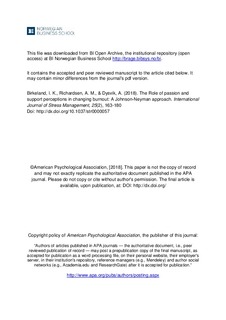The role of passion and support perceptions in changing burnout: A Johnson-Neyman approach
Journal article, Peer reviewed
Accepted version
Date
2018Metadata
Show full item recordCollections
- Publikasjoner fra CRIStin - BI [1015]
- Scientific articles [2173]
Original version
International Journal of Stress Management, 2018, 25(2), 163-180 10.1037/str0000057Abstract
This study explored the relationship between obsessive and harmonious passion for work and burnout, as well as the moderating roles of perceived supervisor support and perceived coworker support. A longitudinal, 3-wave study was conducted among 1,263 members of a large Norwegian workers’ union across a 10-month time span. Harmonious passion for work was related to a decrease in exhaustion and cynicism over time, whereas obsessive passion for work was stably and positively related to exhaustion and cynicism. Furthermore, we suggested that a situational contingency in the form of support perceptions may reduce the negative outcome of obsessive passion but found that this attenuation may depend on the level of the obsessive passion. By applying the Johnson-Neyman statistical technique, we showed that the level of obsessive passion is important in understanding when a supporting environment is actually helpful in protecting against burnout. We still recommend careful selection of coworkers who are genuinely caring and considerate of others, as well as facilitating good relationships at work. However, we also discuss how high levels of obsessive passion might prevent certain employees from gaining from the effects of coworker support
